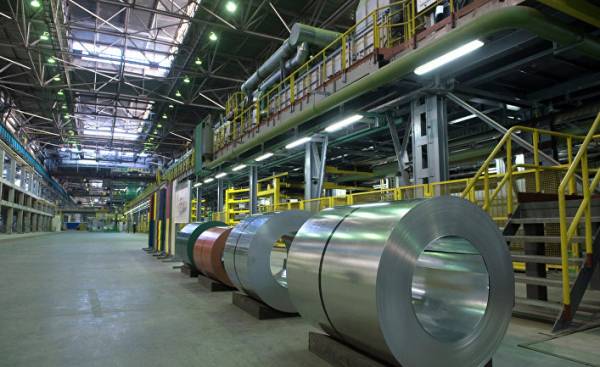
The US imports quite a large quantity of steel and raw materials for steel production from Russia: last year the import volume amounted to 2 million metric tons. Russia ranked seventh in the list of the largest steel exporters in the USA, ahead of even China.
Pig iron is the material used for the manufacture of steel. It can be melted in electric-arc furnaces, and steel scrap. Now, the domestic manufacturers almost never produce marketable pig iron. The pig iron produced in the United States — in blast furnaces is usually completely at odds to American steel manufacturers. That is, America has no iron, which she could sell to others.
Therefore, the United States needs to buy pig iron from abroad. Guess who is its main supplier? Russia.
In April, Russia’s share accounted for 59% of imports in the United States: it exported 288 081 metric ton of pig iron in the United States (for comparison, Brazil exported 108 556 metric tons, Ukraine — 71 321 metric ton).
Overall in April, the volume of imports of pig iron peaked in the last eight months, and Russia continues to dominate the market. According to the Ministry of trade and Committee of foreign trade of the United States, in April, America imported 489 587 metric tons of pig iron.
Moreover, since may last year Russia exported to the United States average of 210 thousand metric tons of other steel products in the month, which totalled about 2.5 million metric tons, as evidenced by the data of monitoring System and analysis of steel imports (SIMA). SIMA is a tool of enforcement and compliance and is part of the Ministry of trade.
Volumes of Russian import of steel reached a peak in 2014 when they amounted to 4.3 million metric tons. This surge led to extend the validity of anti-dumping duties — which already acted in the moment, thanks to the efforts of the local steel producers for some types of rolled steel. The size of these fees varied from 74% to 185% for hot rolled coils.
However, most of the steel products exported from Russia to the United States, is a steel semi-products — blumie billets, ingots and flat blanks. These products are the next step after the pig iron, and they serve as raw materials for the manufacture of final products steel producers in the United States.
The volume of imports of products of Russian steel mills increased sharply in the last few months: 032 381 metric tons in April from 264 055 metric tonnes in March and 187 656 metric tons in February. In may, the imports exceeded 400 thousand metric tons.
Investigation carried out in accordance with article 232 of the Law on trade expansion, will determine whether imports of Russian become a threat to U.S. national security. If so, the Ministry of Commerce may recommend a variety of options — the imposition of additional duties, quotas, and so on — which the President can then take.
Many signals emanating from the trump, indicate that very soon it will spin the nuts in steel imports. The President stated this on Monday, June 12.
However, it is unknown how large — or selective — is this attack on steel imports. Some products of steel production that are not manufactured in the US or pose a threat to national security can be excluded. Meanwhile, some countries — such as China — may be the main target, while other limitations can be avoided.
In addition, on Monday a group of U.S. producers of line pipe made a statement that it belongs to the Russian company EVRAZ North America, which manufactures pipe in Canada, “has deprived American industry of the opportunity to conclude an ambitious deal to sell pipes and aggressively trying to take away other big deals, despite the fact that the administration is preparing to issue recommendations in accordance with Article 232 about whether the import of steel and steel products a threat to national security.” They insist that, in respect of this company were applied accordingly.
If the US administration will choose the hard approach to the question of imports of Russian steel — explaining that the national security requirements — this will help to counter the widespread belief that the President is too soft with Russia, or that he was unduly indifferent to the hacking attacks of the Russians.
But what if the potential measures will not affect Russia or part of its steel exports to the United States? It will cause significant harm to the image of the administration trump. Given the current investigation of hacker attacks Russia, such a decision may lead to more serious suspicion.







